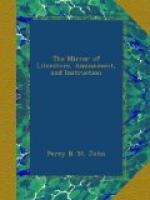An author having shown a portion of a manuscript, which he was preparing for the press, to a friend, the latter suggested some improvements, and pointed out some errors; but instead of receiving his suggestions, the irritable man of letters plainly showed that he did not intend to adopt them. A short time after, he submitted the remainder of his work to the same judge, who having perused it, exclaimed, it could not possibly be better. “Indeed, you really think so?” “Yes,” returned the other, “I really do; for how can it possibly be better when you are resolved to adopt no improvements?”
* * * * *
GLORY.
During the war in the Peninsula, two British soldiers were regaling themselves after a long fast, on a crust of mouldy bread. “This is but sorry fare, Tom,” observed one of them, “especially after the hardships and dangers we have suffered.” “What do you mean by sorry fare,” exclaimed his comrade, with philosophical composure, at the same time holding up a piece of the mouldy bread; “this is what the good people in England, who sit down to a comfortable hot dinner every day, call military glory!”
* * * * *
TORTURE QUINTUPLE.
That solid preacher and able annotator, Philip Limborch, quotes in his History of the Inquisition, a writer of the name of Julius Clarus, who, it would appear formed a very forcible idea of the powers of imagination, since he allows them four parts in five of the torments decreed by that satanic tribunal. “Know,” Limborch represents Clarus saying, “that there are five degrees of torture, videlicit, first, the torture of being threatened to be tortured; secondly, the torture of being conveyed to the place of torture; thirdly, the torture of being, and bound for torture; fourthly, the torture of being hoisted on the torturing rack; and fifthly, and lastly, the torture of squassation.”
* * * * *
APPEARANCES.
Bourganville, when trading to Otaheite, was accustomed to leave there two of some kind of European domestic animals. In his last voyage he had on board a Capuchin and a Franciscan, who differ from each other in the single circumstance of one having the beard shaved and the other wearing it long on the chin. The natives who had successively admired the various animals as they were disembarked, whether bulls and cows, hogs and sows, or he and she goats, shouted with joy at the appearance of the Capuchin, “What a noble animal! what a pity there is not a pair!” scarcely was the wish expressed, when the shaven Franciscan made his appearance, “Huzza, huzza!” exclaimed the savages, “we’ve got the male and the female.”
W.C.B.—M.
* * * * *




